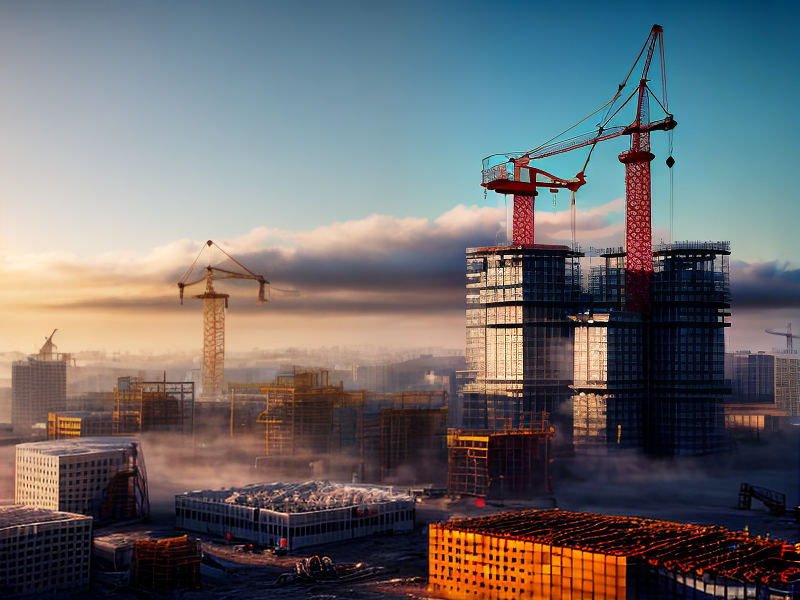In recent years, the construction industry has witnessed a significant transformation with the advent of machine learning and artificial intelligence (AI). These groundbreaking technologies have revolutionized traditional construction processes by automating and streamlining various tasks. From project planning to material management and safety monitoring, machine learning and AI have become indispensable tools for enhancing efficiency, reducing costs, and improving overall productivity. This article explores the profound impact of machine learning and AI in the construction industry and how they are reshaping the future of the sector.
Understanding Machine Learning and AI:
Before delving into the application of machine learning and AI in construction, it is essential to comprehend their fundamental concepts. Machine learning involves the development of algorithms and models that allow computers to learn and make predictions based on data without being explicitly programmed. On the other hand, AI refers to the simulation of human intelligence in machines that can perform tasks, reason, and learn autonomously. When combined, machine learning and AI enable construction professionals to harness vast amounts of data and make informed decisions with unparalleled accuracy.
Improving Project Planning:
One of the key challenges in construction projects is efficient project planning. Machine learning and AI algorithms can analyze historical data, weather patterns, and other relevant variables to generate accurate project schedules and resource allocation plans. By considering factors such as material availability, labor availability, and weather conditions, these technologies minimize delays and optimize the project timeline. This streamlines the construction process, ensuring timely completion and minimizing cost overruns.
Enhancing Safety:
Safety is a paramount concern in the construction industry. Machine learning and AI play a vital role in improving safety measures by detecting potential hazards, monitoring workers' activities, and providing real-time alerts. Intelligent video surveillance systems equipped with AI algorithms can detect unsafe practices, unauthorized access, and potential accidents, allowing for immediate intervention. Predictive analytics models can also identify patterns in historical data to prevent accidents and reduce workplace injuries.
Optimizing Material Management:
Effective management of construction materials is crucial for project success. Machine learning algorithms can analyze historical data on material usage, delivery schedules, and market trends to optimize inventory levels and reduce waste. By predicting material requirements, these technologies prevent shortages or excesses, ensuring just-in-time deliveries and minimizing storage costs. This streamlined approach saves both time and money, enabling construction teams to focus on core operations.
Automation of Repetitive Tasks:
Traditionally, construction projects involved several repetitive tasks that consumed substantial human resources and time. Machine learning and AI offer automation solutions that can handle repetitive tasks with precision and efficiency. For example, robotics equipped with machine learning algorithms can perform tasks such as bricklaying, concrete pouring, and assembly work. This automation not only speeds up the construction process but also reduces labor costs while maintaining consistent quality.
Improving Equipment Maintenance:
Construction equipment is a significant investment in any project. Machine learning and AI algorithms can analyze equipment usage data, monitor performance indicators, and predict maintenance needs. By proactively addressing maintenance requirements, these technologies minimize unexpected breakdowns and reduce downtime. Real-time monitoring of equipment through sensor networks allows construction teams to optimize maintenance schedules, ensure efficient equipment utilization, and extend the lifespan of machinery.
Mitigating Environmental Impact:

Sustainable construction practices are gaining prominence, and machine learning and AI are contributing significantly to reducing the environmental impact of the construction industry. These technologies can analyze data related to energy consumption, waste management, and building materials to identify opportunities for improvement. By optimizing energy usage and material selection, machine learning and AI help achieve energy efficiency, minimize waste generation, and promote the use of eco-friendly construction methods.
Machine learning and AI have emerged as game-changers in the construction industry, offering a wide range of benefits that streamline processes, enhance safety, and improve overall efficiency. By harnessing the power of data, these technologies empower construction professionals to make data-driven decisions, optimize resource allocation, and reduce costs. As the industry continues to embrace machine learning and AI, we can expect more innovative applications that transform the way we approach construction projects. Embracing this technological revolution is crucial for construction companies to stay competitive, deliver projects on time, and meet the evolving demands of the modern world.
